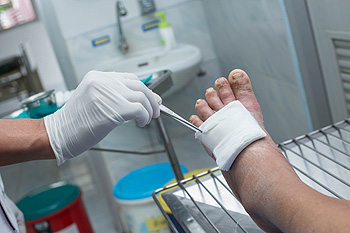Ignoring a foot infection can lead to serious complications. Infections often start when bacteria or fungi enter through small openings in the skin, such as cuts or cracks. Symptoms of foot infections can include redness, swelling, pain, warmth, and discharge from the affected area. Common infections like athlete’s foot or toenail fungus, as well as conditions like ingrown toenails, can escalate if untreated. People with diabetes are particularly vulnerable, as reduced sensation and blood flow to the feet can delay the detection and healing of infections, increasing the risk of complications like cellulitis. A chiropodist is trained to identify the underlying cause of a foot infection and provide tailored treatments, including topical or oral medications, as needed. They can also educate you on proper foot hygiene and preventive measures to lower the risk of recurring infections. If you have an infected sore or wound on your foot, it is suggested that you schedule an appointment with a chiropodist.
Wound care is the process of treating and preventing wounds on the feet. This is especially important if you have diabetes, as diabetic foot wounds are common and can lead to serious complications when left untreated. To learn more about proper wound care, please consult with Emily Yu, B.Sc from Uptown Foot Care Clinic. Our specialist will assess your condition and provide you with quality foot and ankle treatment.
Why Is Wound Care Important for Diabetics?
While wound care is important for maintaining the health of your feet, it is especially important for people with diabetes. This is because diabetics often suffer from poor blood circulation, causing foot wounds to heal very slowly or not to heal at all. Diabetics also frequently suffer from neuropathy or nerve loss. This means no matter how big or little the wound, they might not feel it on their foot. If the wound becomes severely infected, amputation may be necessary. This is why it is imperative that diabetics complete daily foot checks.
Wound Care Basics
The best way to care for wounds is to prevent them in the first place. It is recommended that people with diabetes perform a daily examination of their feet to locate cuts, scrapes, sores, or wounds. Early detection allows for ample time to treat the wounds and prevent further complications. If you notice a wound at home, you can clean it using water, apply an antibiotic ointment, and cover the wound with a clean bandage. Seeing a chiropodist, who can examine your feet thoroughly and treat any existing wounds, can also help you maintain proper foot health.
If you have any questions, please feel free to contact our office located in . We offer the newest diagnostic and treatment technologies for all your foot care needs.

